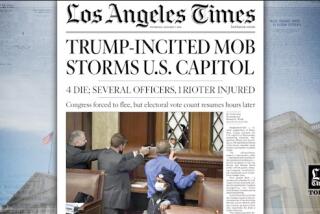Book Depicts Chaotic White House : Presidency: Intimate look at Clinton’s first year paints scenes of indecision, reluctance to delegate. Role of Fed chairman, First Lady among focus.
- Share via
WASHINGTON — Insistent advice from Federal Reserve Board Chairman Alan Greenspan to President Clinton during the presidential transition and early in the new Administration led Clinton to pursue lower federal budget deficits at the expense of the economic populism of his campaign, according to a new book.
The book, “The Agenda: Inside the Clinton White House” by Washington Post Assistant Managing Editor Bob Woodward, is an intimate look at how the new Democratic President and his stumbling, feuding team of advisers struggled to formulate and adopt an economic program during Clinton’s first year in office.
Greenspan is described as a central player, albeit once removed from the inner circle. The book recounts what Woodward calls a crucial meeting between Clinton and Greenspan in Little Rock, Ark., in December, 1992, the month before Clinton’s inauguration.
During the 2 1/2-hour session, the Fed chairman told the President-elect that reducing the long-term federal budget deficit was “essential” and that the economic recovery could fall on its face if policies credible to Wall Street, particularly to bond traders, were not advanced.
It is customary for the President and the Fed chairman to hold periodic meetings. But in Woodward’s recounting of their relationship, Greenspan, a Republican appointed by President Ronald Reagan and reappointed by President George Bush, comes across as a senior adviser, almost a teacher to Clinton.
Greenspan outlined to Clinton an economic approach Woodward calls the “financial markets strategy,” in which policy was to be designed to send a message to Wall Street and ultimately drive down interest rates. According to the theory, the economy would improve as a result, and Clinton would have more tax revenue to spend on favored domestic programs, boosting his reelection chances in 1996.
The theory, and the policy that Clinton adopted, bore little resemblance to the economic program on which Clinton had campaigned. Clinton’s “putting people first” campaign banner stressed government “investment” in programs that would improve the lives of middle-class Americans, such as job training, early education and government promotion of cutting-edge technology.
A middle-class tax cut and health care for all Americans were additional sweeteners.
Greenspan’s advice to Clinton that a long-term deficit-reduction program was of paramount importance was backed not only by Treasury Secretary Lloyd Bentsen but also by Budget Director Leon E. Panetta and his deputy, Alice Rivlin, according to the book.
The President’s economic advisers, with his assent, quickly jettisoned the tax cut, delayed health care reform, and then added an energy tax and spending cuts.
Clinton’s political team--campaign advisers James Carville and Paul Begala, media adviser Mandy Grunwald and pollster Stanley B. Greenberg--are portrayed as horrified and disgusted with this effort to please the financial markets.
The four seem to have spent much of last year decrying what they saw as mismanagement at the White House and firing off memos arguing that the President and some of his aides had lost their souls to the deficit-cutters.
Even Clinton, while intellectually acquiescing in the devastation of his investment programs, raged nonetheless at how it happened.
While the book depicts him as highly intelligent and energetic, it recounts several Clinton temper tantrums, quoting senior aide George Stephanopoulos as calling them “the wave”--overpowering, prolonged rages that shocked outsiders and often seemed far out of proportion to their cause.
Recurring themes in the book are Clinton’s inability to terminate debate and make a decision, and his reluctance to delegate.
Amid the internal debate over the budget, Clinton is portrayed as holding repeated, seemingly endless meetings at which issues rarely were decided and during which he frequently changed his mind.
Once the budget was passed--by one vote in the House and a tie-breaking Senate vote by Vice President Al Gore--Bentsen is said to have taken Clinton aside and warned him he was mismanaging the presidency by trying to make every small decision and refusing to delegate.
Some of those concerns appeared to grow out of a White House with little management structure, in which the four political aides had unusual status.
Outside the normal avenues, they sent anguished, internal memos to the White House warning of the near-collapse of the Clinton presidency and demanding meetings with the President and senior advisers.
One of the memos, written in July as the White House headed into the crucial month leading up to the budget vote, warned apocalyptically that the “current course, advanced by our economic team and congressional leaders, threatens to sink your popularity further and weaken your presidency.”
The memo prompted First Lady Hillary Rodham Clinton to go to White House Chief of Staff Thomas (Mack) McLarty and insist it was “panic time,” with no plan to sell the program they were about to send to Congress, no strategy and no decisions made on key elements.
Hours of debate, presided over by Clinton, ensued among the political team and policy advisers.
At one crucial meeting last July attended by the President and the First Lady, Hillary Clinton chastised both the economic and political teams for poorly serving Clinton, for lacking organization and planning, and for creating a “dysfunctional” White House.
She complained they had allowed Clinton to appear to be a “mechanic in chief,” erased his “moral voice” and changed his economic program from a “values document” to a bunch of numbers. “I want to see a plan” for selling the program, she demanded.
Most saw Hillary Clinton’s denunciations in that meeting, which were followed by a burst of anger from Clinton at his staff, as an indictment of McLarty, whom the book portrays as an ineffective, sometimes bumbling character with no feel for politics and a fundamental misunderstanding of congressional relations.
Hillary Clinton’s July critique, Woodward writes, amounted to a “scalding indictment of McLarty. At crucial moments like this, Hillary was often de facto chief of staff.”
More to Read
Sign up for our Book Club newsletter
Get the latest news, events and more from the Los Angeles Times Book Club, and help us get L.A. reading and talking.
You may occasionally receive promotional content from the Los Angeles Times.










